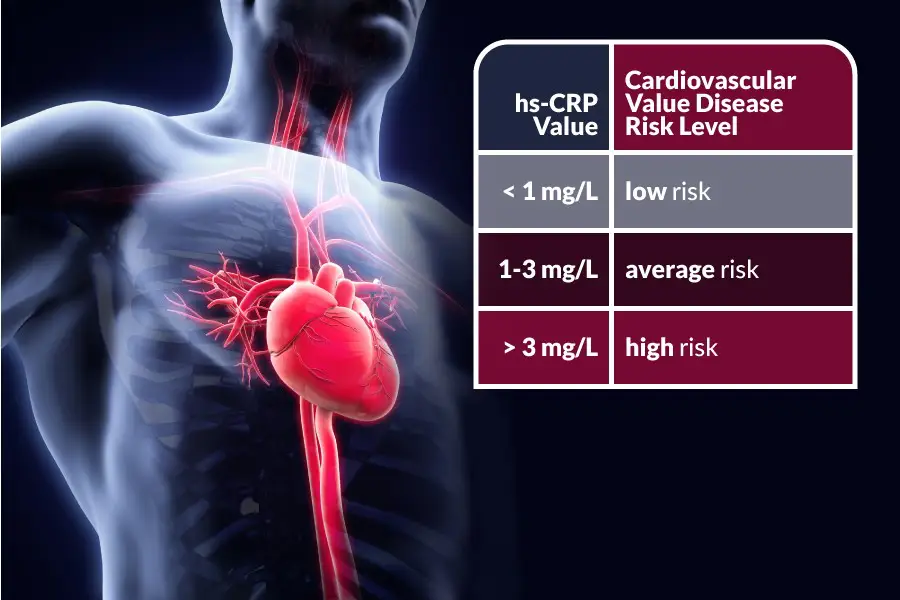Tests Included (1)
- HIGH SENSITIVITY C-REACTIVE PROTEIN (HS-CRP)
C-reactive protein (CRP) is a protein that increases in the blood with inflammation and infection as well as following a heart attack, surgery, or trauma. Studies have suggested that a persistent low level of inflammation plays a major role inatherosclerosis, the narrowing of blood vessels due to build-up of cholesterol and otherlipids, which is often associated with cardiovascular disease (CVD). The hs-CRP test accurately measures low levels of CRP to identify low but persistent levels of inflammation and thus helps predict a persons risk of developing cardiovascular disease.
There are two different tests that measure CRP and each test measures a different range of CRP level in the blood for different purposes:
- The standard CRP test measures markedly high levels of the protein to detect diseases that cause significant inflammation. It measures CRP in the range from 10 to 1000 mg/L. This test may be used to detect inflammation.
- The hs-CRP test accurately detects lower levels of the protein than the standard CRP test. It measures CRP in the range from 0.5 to 10 mg/L. This test is used to evaluate individuals for risk of cardiovascular disease.
High-sensitivity CRP is one of a growing number of cardiac risk markers that are used to help determine a persons risk. Some studies have shown that measuring CRP with a highly sensitive assay can help identify the risk level for cardiovascular disease in apparently healthy people. This more sensitive test can measure CRP levels that are within the higher end of the reference range. These normal but slightly high levels of CRP in otherwise healthy individuals can predict the future risk of a heart attack, stroke, sudden cardiac death, and peripheral arterial disease, even when cholesterol levels are within an acceptable range.
hs-CRP could be a marker not only in apparently healthy people,recent studies have shown. Adults with congenital heart disease (ACHD) with elevated CRP have worse functional status and exercise capacity, greater risk for death, or non-elective cardiovascular hospitalization.
How is the test used?
A high-sensitivity C-reactive protein (hs-CRP) test measures low levels of CRP and may be used to help evaluate an individual for risk of cardiovascular disease (CVD). It may be used in combination with a lipid panelor with othercardiac risk markers, such as a lipoprotein-associated phospholipase A2 (Lp-PLA2) test, to provide added information about heart disease risk.
High-sensitivity CRP is thought by some experts to be a useful test for determining risk of cardiovascular disease, heart attacks, and strokes and that hs-CRP can play a role in the evaluation process before a person develops one of these health problems. Some say that the best way to predict risk is to combine a good marker for inflammation, like hs-CRP, with the lipid panel. Several groups have recommended that this test be used for people who have a moderate risk of heart attack over the next 10 years.
However, not all health professionals agree on hs-CRPs usefulness. Clinical trials that involve measuring hs-CRP levels are currently underway in an effort to better understand its role in cardiovascular events. These studies will help to form and refine guidelines on its use in screening and treatment decisions.
When is it ordered?
Currently, there is no consensus on when to get tested, though some guidelines include recommendations on hs-CRP testing. For example, a guideline from the American College of Cardiology Foundations and the American Heart Association says that hs-CRP testing may be useful when men 50 years old or younger and women 60 years old or younger have intermediate risk. It also may be useful for treatment decisions when men and women are older than these respective ages and haveLDL-Cless than 130 mg/L and meet several other criteria, such as no existing heart disease, diabetes, kidney disease, or inflammatory conditions.
When hs-CRP is evaluated, it may be repeated to confirm that a person has persistent low levels of inflammation.
What does the test result mean?
Relatively high levels of hs-CRP in otherwise healthy individuals have been found to be predictive of an increased risk of a future heart attack, stroke, sudden cardiac death, and/or peripheral arterial disease, even when cholesterol levels are within an acceptable range.
People with higher hs-CRP values have the highest risk of cardiovascular disease and those with lower values have less risk. Specifically, individuals who have hs-CRP results at the high end of the normal range have 1.5 to 4 times the risk of having a heart attack as those with hs-CRP values at the low end of the normal range.
Here are what the results mean:
- hs-CRP level of lower than 1.0 mg/L -- low risk of cardiovascular disease
- hs-CRP level of 1.0 mg/L and 3.0 mg/L -- moderate risk of cardiovascular disease
- hs-CRP level of more than 3.0 mg/L -- high risk of cardiovascular disease
These values are only a part of the total evaluation process for cardiovascular diseases. Additional risk factors to be considered are elevated levels of cholesterol,LDL-C,triglycerides, andglucose. In addition, smoking, high blood pressure (hypertension), and diabetes also increase the risk level.
Booking Procedure:
- Fill the booking form on right side with Name, Address, Mobile no.
- Blood/Urine samples will be collected from your Home address. 10-12 hrs fasting is required.
- You need to make the payment by cash to Thyrocare when Technician comes to pick up the samples OR Pay online after confirmation of booking.
- Reports will be couriered at your residence in 3-4 working days if hardcopy is opted. We will email the reports within 48-72 hrs on your email address mentioned while booking.
- Sample pickup at home
- Online reports within 48 hours

User Reviews
Please add your review
Similar test/profile
At Second Medic, we offer a comprehensive range of lab tests to help diagnose and monitor a wide variety of medical conditions. Our state-of-the-art laboratories are equipped with the latest technology and staffed by highly trained professionals, ensuring that our patients receive accurate and reliable results.
We offer a wide range of lab tests, including blood tests, urine tests, and other diagnostic tests. Our lab tests are designed to provide a comprehensive view of a patient's health, allowing us to detect and monitor medical conditions early on, and make informed treatment decisions.
We understand that lab tests can be stressful, which is why we strive to make the process as easy and comfortable as possible for our patients. Our team of friendly and compassionate professionals are always available to answer any questions or concerns that our patients may have.
At Second Medic, we are committed to providing the highest quality lab tests and personalized care to our patients. We believe that every patient is unique and deserves a personalized approach to their healthcare, and we work closely with our patients to develop individualized treatment plans that meet their specific needs.
If you are in need of lab tests, we invite you to schedule an appointment at one of our convenient locations today. Our team looks forward to serving you and helping you achieve optimal health and wellness.







